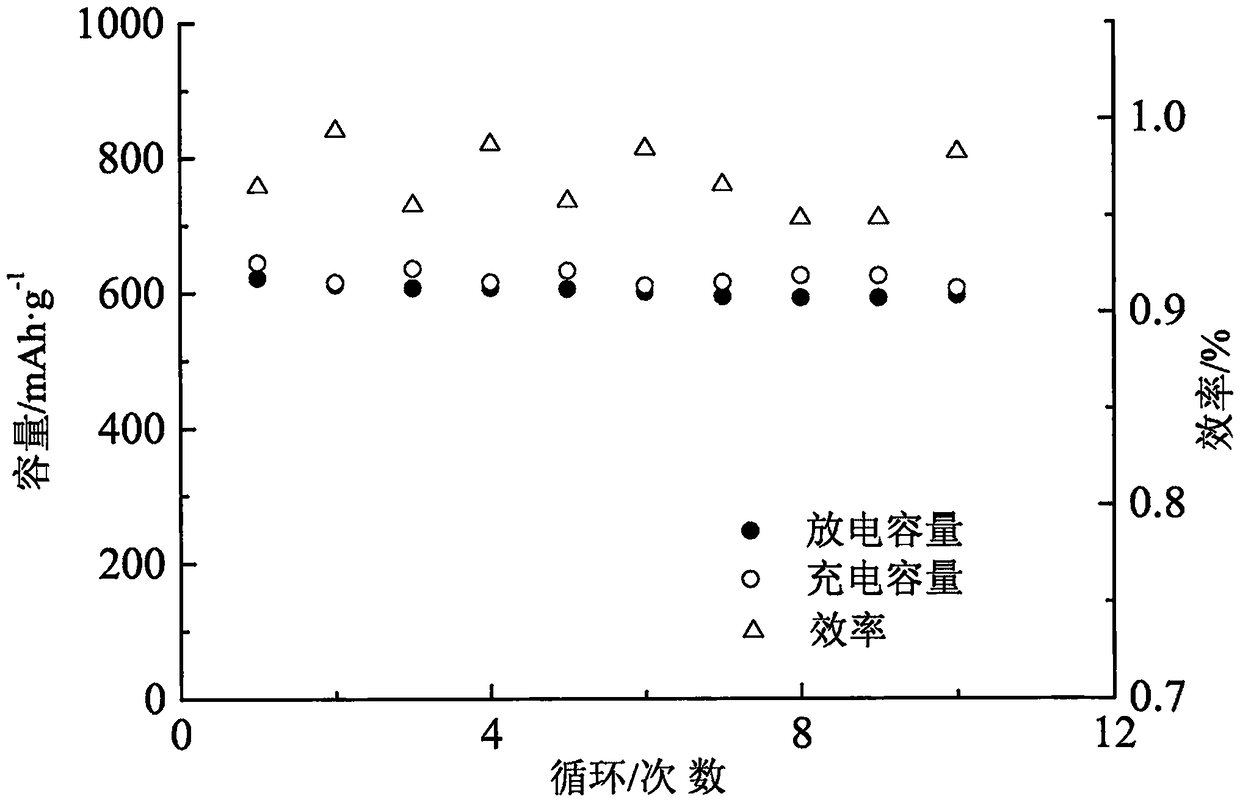A negative electrode material for double perovskite sodium-ion battery synthesized by selective crystallization controlled by electric field and its preparation method
A sodium-ion battery, selective crystallization technology, applied in the direction of battery electrodes, negative electrodes, secondary batteries, etc., can solve the problems of complex mechanism of matrix action, high activation energy of sodium ion diffusion, affecting material reversibility, etc., to achieve accelerated migration ability And the rate of redox reaction, improve the conductivity of sodium ion, reduce the effect of electron migration resistance
- Summary
- Abstract
- Description
- Claims
- Application Information
AI Technical Summary
Problems solved by technology
Method used
Image
Examples
Embodiment 1
[0021] Embodiment 1: with barium nitrate, sodium nitrate, potassium nitrate, lanthanum nitrate hexahydrate, zirconium nitrate pentahydrate, manganese nitrate tetrahydrate, ammonium molybdate tetrahydrate, nickel nitrate hexahydrate according to stoichiometric formula NaBa 0.3 La 0.3 K 0.4 Zr 0.8 Ni 0.1 mn 0.1 MoO 6 Put it into a ball mill, the mass ratio of the ball mill and the material is 20:1, and ball mill at a speed of 400 rpm for 20 hours. The ball-milled material is heated up to 900°C at a rate of 10°C / min in a tube furnace, and then a DC voltage of 900V is applied to both ends of the tube furnace. Cool the furnace to 30°C; grind the cooled material in a mortar for 12 minutes, and immerse it in a saturated solution of lithium metaborate at a constant temperature of 30°C under constant stirring at a speed of 1200 rpm with a polytetrafluoroethylene stirring paddle. The mass ratio of the immersed cooled material was 10:1. After stirring for 9 minutes, the constant te...
Embodiment 2
[0022] Embodiment 2: barium nitrate, sodium nitrate, potassium nitrate, lanthanum nitrate hexahydrate, zirconium nitrate pentahydrate, manganese nitrate tetrahydrate, ammonium molybdate tetrahydrate, nickel nitrate hexahydrate according to stoichiometric formula NaBa 0.3 La 0.3 K 0.4 Zr 0.8 Ni 0.1 mn 0.1 MoO 6 Put into the ball mill, the mass ratio of the ball mill and the material is 20:1, and ball mill for 15 hours at a speed of 400 rev / min. The ball-milled material is heated to 900°C at a rate of 8°C / min in a tube furnace, and then a DC voltage of 900V is applied to both ends of the tube furnace. Cool the furnace to 30°C; grind the cooled material in a mortar for 12 minutes, and immerse it in a saturated solution of lithium metaborate at a constant temperature of 30°C under constant stirring at a speed of 1000 rpm with a polytetrafluoroethylene stirring paddle. The mass ratio of the immersed cooled material was 10:1. After stirring for 7 minutes, the constant temperat...
Embodiment 3
[0023] Embodiment 3: barium nitrate, sodium nitrate, potassium nitrate, lanthanum nitrate hexahydrate, zirconium nitrate pentahydrate, manganese nitrate tetrahydrate, ammonium molybdate tetrahydrate, nickel nitrate hexahydrate according to stoichiometric formula NaBa 0.3 La 0.3 K 0.4 Zr 0.8 Ni 0.1 mn 0.1 MoO 6 Put it into a ball mill, the mass ratio of the ball mill to the material is 20:1, and ball mill for 10 hours at a speed of 200 rpm. The ball-milled material is heated to 800°C at a rate of 2°C / min in a tube furnace, and then a DC voltage of 600V is applied to both ends of the tube furnace. Cool the furnace to 30°C; grind the cooled material in a mortar for 6 minutes, and immerse it in a saturated solution of lithium metaborate at a constant temperature of 30°C under constant stirring at a speed of 900 rpm with a polytetrafluoroethylene stirring paddle. The mass ratio of the mass to the immersed cooled material was 10:1. After stirring for 5 minutes, the constant te...
PUM
 Login to View More
Login to View More Abstract
Description
Claims
Application Information
 Login to View More
Login to View More - R&D
- Intellectual Property
- Life Sciences
- Materials
- Tech Scout
- Unparalleled Data Quality
- Higher Quality Content
- 60% Fewer Hallucinations
Browse by: Latest US Patents, China's latest patents, Technical Efficacy Thesaurus, Application Domain, Technology Topic, Popular Technical Reports.
© 2025 PatSnap. All rights reserved.Legal|Privacy policy|Modern Slavery Act Transparency Statement|Sitemap|About US| Contact US: help@patsnap.com

